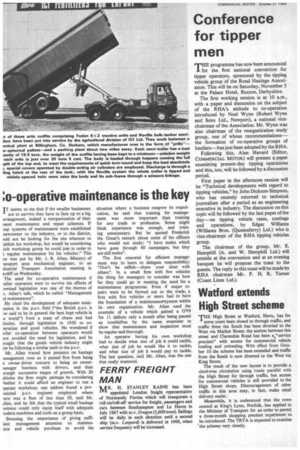:o-operative maintenance is the key
Page 32

If you've noticed an error in this article please click here to report it so we can fix it.
IT seems to me that if the smaller businesses are to survive they have to face up to a big trrangement, indeed a reorganization of their !sent maintenance and repair schemes. If oup systems of maintenance were established newcomer to the industry, or to the district, iuld not be looking for the site whereon to :ablish his workshop, but would be considering tich workshop group he could join in order to t regular maintenance for his vehicles." This nv was put by Mr. J. R. Allan, Ministry of .ansport area mechanical engineer, to an dustrial Transport Association meeting in ardiff on Wednesday.
The need for co-operative maintenance if -taller operators were to survive the effects of omised legislation was one of the themes of .r. Allan's talk, which he called: "Management id maintenance".
He cited the development of adequate mainnance in the p.s.v. field ("the British p.s.v. is )vir said to be in general the best kept vehicle in a world") from a state of chaos and bad :hides, through legislation in 1930 to cooeration and good vehicles. He wondered if truer co-operation between operators would pie avoided the need for legislation, and he mught that the goods vehicle industry might ow be following a similar path to the p.s.v.
Mr. Allan traced how pressure on haulage ianagement rose as it passed first from being n owner-driver concern to being an ownertanager business with drivers, and then trough successive stages of growth. With 20 elides the firm might perhaps be considering ,hether it could afford an engineer to run a :parate workshop; one seldom found a pro:ssional p.s.v. engineer employed where tere was a fleet of less than 50, said Mr. dlan, and he felt that the typical small haulage usiness could only equip itself with adequate lodern machines and tools on a group basis.
Stressing the importance of giving suffiient management attention to mainten.nce and vehicle purchase to avoid the situation where a business outgrew its organization, he said that training for management was more important than training for any trade or profession. Some might think experience was enough, and training unnecessary. But he quoted Frederick the Great's remark about some of his officers who would not study: "I have mules which have gone through 40 campaigns, but they are still mules".
The first essential for efficient management was to learn to delegate responsibility: "Don't be selfish—share your ulcer with others". In a small firm with few vehicles the thing for managers to consider was how far they could go in meeting the need for a maintenance programme. Even if major repairs were to be farmed out to the trade, a firm with five vehicles or more had to have the foundation of a maintertancesystem within its own organization. Mr. Allan used the example of a vehicle which gained a GV9 for 11 defects only a month after being passed as troublefree by the same examiner to show that maintenance and inspection must be regular and thorough.
An operator having his own workshop had to decide what size of job it could tackle, what size of job he would like it to tackle, and what size of job it would pay to tackle. The last question, said Mr. Allan, was the one that really mattered.












































































































































